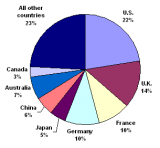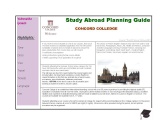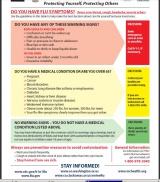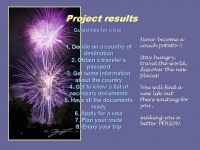Результаты исследования учащихся в проекте Traveling abroad planning
Зміст
Название проекта
Обговорення:Учебный проект "Traveling abroad planning"
Авторы и участники проекта
Лацько Лариса Николаевна и ученики 10-11 классов
Тема исследования групп участников проекта
Группа №1 “Tourists” - What documents and procedure does one have to go through when planning a tourist trip?
Группа №2 “Students” - What documents and procedure does one have to go through when planning to study abroad?
Группа №3 “Others" - General questions on travelling abroad, tips, advice, importance of language
Краткое описание каждой из групп
“Tourists”
How do we travel on our own? Is it safe? What documents do we need to cross the border? Our group was looking for these and many other questions relating to a proper trip planning. We were focusing on tourist trips, nothing else. We found out that it is quite possible without any fear and adults to gather all the proper documentation, buy air tickets and find accommodation for the planed period of stay. We conducted an interesting research and discovered that it takes up to three weeks on average to plan a well organized tourist trip abroad and that does not include visa arrangements. You will be surprised to know that in some case getting a Visa might take up to 2 months. Each member of our group was involved in its own task and after its completion we crated a small chart summing up the entire important thing one should know, do and follow before going on tourist trip abroad. As a country of destination we picked up Lebanon. Here take a look!
World Popular Destinations
Some pretty interesting facts about tourists
"Students"
For those who like studying not just in their home country we are welcoming to join our team in finding out what do we need to do in order to go and study abroad. As we are still at secondary school we decided to look at a short term study abroad - language camp in Great Britain. For those who would like to think about your further education a brief guideline will be provided.
According to Organization of Economic Cooperation and Development (OECD), international students are those who travel to a country different from their own for the purpose of tertiary study. Despite that, the definition of international students varies in each country in accordance to their own national education system. So we can boldly call ourselves prospective international students while organizing our trip to England this coming summer.
Study Abroad Planning Guide
“Others”
Study-abroad programs offer students an exciting opportunity for learning and cultural exchange. Study-abroad programs are increasing in availability and geographic diversity; thus, students can expect to deal with cultures and environments that are very different from their own.
Students may be at increased risk of illness or injury due to these cultural and environmental differences, such as climate extremes, the presence of certain insects, inadequate sanitation, and poorly lit roads. Travel to developing regions of the world, especially for a period of several weeks or months, can be particularly challenging.
Few events can negatively impact the travel experience more than becoming sick or being injured while far away from home. To reduce health risks while studying abroad, the Centers for Disease Control and Prevention recommends the following general guidelines for students.
To reduce your risk of illness
• In developing areas, boil your water or drink only bottled water or carbonated (bubbly) drinks from cans or bottles with intact seals. Do not drink tap water or fountain drinks or add ice to beverages. Avoid eating salads, fresh vegetables and fruits you cannot peel yourself, and unpasteurized dairy products.
• Eat only food that has been fully cooked and served hot, and avoid food from street vendors. If living with a host family, discuss any food allergies or dietary preferences in advance.
• Do not touch animals, including domestic pets, and especially do not touch monkeys, dogs, and cats, to avoid bites and serious diseases (such as rabies and plague). If you are bitten or scratched by any animal, get medical attention right away, and immediately clean the wound well with large amounts of soap and water and a povidone-iodine solution, such as Betadine®, if available.
• Wash your hands often with soap and water, especially before meals and after going to the bathroom. If soap and water are not available and your hands are not visibly dirty, use an alcohol-based hand gel (containing at least 60% alcohol) to clean your hands. Cleaning your hands often with soap and water removes potentially infectious material from your skin and helps prevent disease transmission.
• If visiting an area where there is risk of malaria, use insect repellent and a mosquito net for sleeping, wear long-sleeved shirts and long pants outdoors between dusk and dawn, and make sure to take your malaria prevention medication before, during, and after your trip, as directed.
• Be aware that sexually transmitted diseases (STDs), including HIV/AIDS, are among the most common infections worldwide. The most reliable way to avoid transmission of sexually transmitted diseases is to abstain from sexual activity or to be in a long-term mutually monogamous relationship. For people whose sexual behaviors place them at risk for STDs, correct and consistent use of latex or polyurethane condoms when engaging in sexual activity can greatly reduce a person’s risk of acquiring or transmitting STDs, including HIV infection.
• Automobile accidents are the leading cause of preventable deaths in travelers. Wear your seat belt and follow the local customs and laws regarding pedestrian safety and vehicle speed. Remember to check on what side of the road people drive, because this may differ in the country or countries you will be visiting. Use helmets when riding bicycles and motorcycles.
• Remember not to drink alcoholic beverages and drive. The most important risk factor for road traffic injuries is the presence of alcohol in the blood of a driver or pedestrian who is injured.
• Be aware of the cultural impact of being involved in or causing an accident that includes injury to the local population. In unfamiliar or foreign environments, utilize a local driver. It is important to note the legal age for driving varies by country.
• Swim in well–maintained, chlorinated pools, and only if you are an experienced swimmer. Drowning is also a leading cause of death in travelers.
• If visiting an area which has risk of water-borne infections (i.e., schistosomiasis), do not swim in lakes or streams or other fresh bodies of water.
• To prevent infections such as HIV and hepatitis B, avoid receiving tattoos, body piercings, or injections.
After your return
On return from study abroad, if you are not feeling well or have been injured, get medical attention, including psychological support and counseling, if necessary.
If you are returning from malaria-risk areas and become sick with a fever or flu-like illness, for up to 1 year after your return, get immediate medical attention and be sure to tell the doctor or health-care provider your travel history.
Some useful tips on traveling
Flu chart
Проблемный вопрос (вопрос для исследования)
Эффективная самостоятельная организация поездки заграницу
Гипотеза исследования
Я считаю, что мне удастся научить ребят старшеклассников оформлять все необходимые документы и решать соответствующие вопросы, касающиеся поездки заграницу, самостоятельно и с уверенностью общаться с иностранными лицами, относящимися непосредственно к планировке путешествия.
Цели исследования
Выявить уровень уверенности старшеклассников при общении с родными носителями языка Предоставить учащимся возможность проявить самостоятельность при выполнении задания Предоставить учащимся информацию, способную в дальнейшем оказать им помощь
Результаты исследования
As we completed our project, we have constructed a chart, guidelines that summarize the most important and necessary steps one must follow. If all the steps are fulfilled a pleasant with everlasting memory journey is guaranteed to you.
Please refer to the chart below.
Вывод
We interview a friend of our group member who’d been on a six-month trip through Africa and asked him about the most important thing he learned from that trip. Without any hesitation, he answered, “That trip taught me to follow my heart”.
Travel has taught him to see the details of life. In the familiar, our eyes brush over the surroundings as we pursue daily tasks and goals with a kind of mental tunnel vision. Traveling removes us from the known and forces to be more attentive: from the way blades of grass jitter in the wind to the calcium deposits crawling up ancient fountains to the ripple of cloud shadows over ceramic roof tiles. These details hold the wonder in life; travel gives us access to them. The result is a richer, more meaningful experience and long lasting memory.
As you go on your journey please never forget about troubles you might encounter. For that our team has developed a safety plan that will help you and bring you to the right people in case of emergency.
Make sure you have a signed, valid passport, and a visa, if required, and fill in the emergency information page of your passport.
Leave copies of your itinerary, passport data page and visas with family or friends, so you can be contacted in case of an emergency.
Ask your medical insurance company if your policy applies overseas, and if it covers emergency expenses such as medical evacuation. If it does not, consider supplemental insurance.
While in a foreign country, you are subject to its laws. The State Department web site at [1] has useful safety and other information about the countries you will visit.
To avoid being a target of crime, do not wear conspicuous clothing or jewelry and do not carry excessive amounts of money. Also, do not leave unattended luggage in public areas and do not accept packages from strangers.
There is so much joy to be had and awe to be present in our lives when we continue to learn and grow. A favorite saying of ours is “When you’re green you’re growing and when you’re ripe you’re rotten.” Traveling presents you with unlimited opportunities to learn. That is what travel is – a process of discovery. We learn an incredible amount about life and ourselves through experiences traveling.
Never become a couch potato!! Stay hungry, travel the world, and discover the new places! You will find a new life out there waiting for you, making you a better person!
Полезные ресурсы
Предлагаем вашему вниманию несколько сайтов, где в режиме on-line:
Know where to buy your tickets




